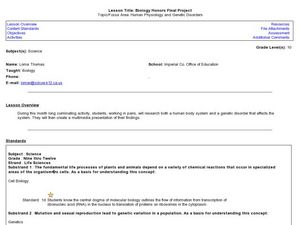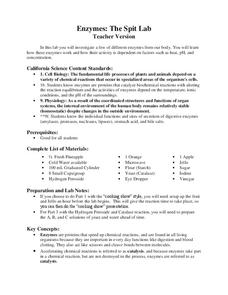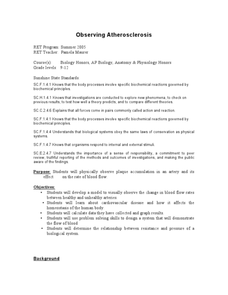Curated OER
The Color of Soil
Students are introduced to the Munsell System of Color Notation that is used for direct comparison of soils anywhere in the world. They become familiar with hue, value and chroma notations, identify colors that act as clues to the...
Curated OER
Cell Communication
High schoolers clarify common misconceptions about cells. They assess initial knowledge of cells and cell behavior, read and discuss an article and consider the role of cell communication in the diseases of diabetes, multiple sclerosis...
Curated OER
Anatomy of the Brain
Students explore the brain. In this science lesson, students view a diagram of the brain and discuss the various regions of the brain. Students discuss the importance of protecting the brain and design a protective covering.
Curated OER
Biology Honors Final Project
Tenth graders work on a project about cellular biology and genetics. In this biology lesson, 10th graders research about the assigned human body system and genetic disorders that affect it. They create a multimedia presentation and...
Curated OER
What's Inside
Students become more familiar with life science in the context of the scientific method which helps them to become familiar with the various kinds of life science diagrams they may see on a GED science test.
Curated OER
Building a Baby
Students study the fetal development of humans. In this development lesson students divide into groups and research the different gestational weeks of a fetus.
University of Minnesota
Dendritic Spines Lab
This is your brain on drugs ... literally! Your neuroscientists-in-training examine the evidence of drug use on the human brain and how neurons change their connectivity when altered by drugs. They then work together to create testing...
LABScI
Vision Lab: The Eye
Our bodies have some amazing capabilities, but there are some limitations. Explore the limitations of the human eye through the eighth lab activity in a series of 12 biology lessons. Individuals measure their own peripheral vision...
LABScI
Enzymes: The Spit Lab
Enzymes in our bodies each have a job to do. Learn the factors that affect the activity of some enzymes using the third activity of an informative 12-part biology series. A three-part laboratory activity asks teams to investigate how...
Curated OER
Keeping Healthy
Students exercise their muscles to explore concept of heart rate and to explain how blood supplies muscles with oxygen.
Curated OER
Ya' Gotta Have Heart
Fourth graders study the parts of the human circulatory system and how they function. They design a flow chart of the circulatory system and use data to construct charts and graphs.
Curated OER
Making a Brain: Aritifical Neural Network
Students explore how the brain works. For this nervous system lesson, students create a network of "neurons" to simulate how the nervous system and the brain work together.
Curated OER
Help, I can't reach it!
Students learn the major organ systems in the human body and research simple machines on the Internet; They design an informational brochure about a medical profession and present that career topic to the class.
Curated OER
Anthrax Attacks
Middle schoolers develop an understanding about the disease Anthrax, how it is transmitted, and its effects on the body. They use this online lesson to research the disease and its impact on human health. Students gain knowledge that...
Curated OER
Major Functions
Seventh graders investigate the basic characteristics and needs of living things. They identify the major parts of plants and animals by making lists. Students focus upon one living thing and speculate how if one part is changed how it...
Curated OER
What Do We Have In Common?
Seventh graders perform a dissection on a mussels and label their internal organs. In groups, they compare and contrast the mussels structure to those of human beings. They also review the functions that are necessary for survival and...
Curated OER
Laparoscopy Tissue Biopsy
Students describe the anatomy and physiology of a selected organ. They identify the major artery and vein that delivers blood to and from the selected organ and construct an accurate scaled 3D model of a selected organ.
Curated OER
Testing for Life’s Molecules
Want to hear a joke about sodium? Na. Young scientists test various materials to identify if they include protein, starch, and glucose by using the Biuret test, iodine starch test, and Benedict's test respectively. After practicing with...
Teach Engineering
Biomimicry and Sustainable Design - Nature is an Engineering Marvel
Discover how copying nature can be beneficial to humans. Scholars read articles about examples of biomimicry and its potential applications. Along the way, they learn about Nature's Nine Laws and how they relate to biomimicry. This is...
Curated OER
Our Amazing Skeleton
Students study the skeleton, about the number of and types of bones in the body, and how outer space affects astronauts' bones. They discover how to take care of their bones here on Earth to prevent osteoporosis, or, weakening of the...
Curated OER
Observing Atherosclerosis
Students develop a model to visually observe the change in blood flow rates between healthy and unhealthy arteries. They calculate data that they have collected and graph their results. They determine the relationships the flow of...
Curated OER
Bones
Fifth graders observe real bones and models to learn about the structure and function of the skeletal system. In this skeletal system lesson, 5th graders manipulate objects and models of bones. They handle real bones and determine the...
Curated OER
Sense of Hearing
Create a graphic organizer to review parts and systems of the body, then present a new topic. Special education students grades 3-5 learn about the sense of hearing. They draw parts of the ear, sign a song, read Perk Up Your Ears, and...
Curated OER
The Science of Respiration and Blood Circulation
Fifth graders study how respiration and circulation are connected. In this respiratory lesson students complete several activities to better understand heart rate and carbon dioxide in the body.























